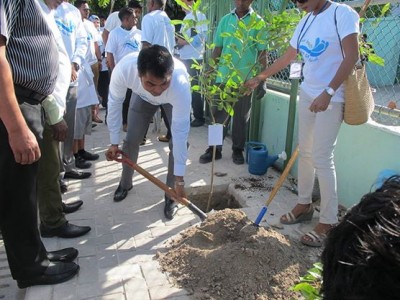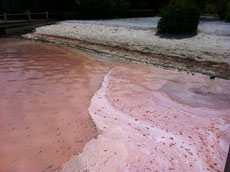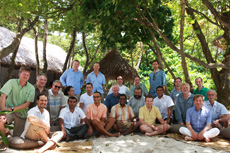The Maldivian people will be among the world’s first climate change refugees due to sea level rise if global warming is not averted, former President Mohamed Nasheed has warned.
In his keynote address at the ‘International Bar Association’s (IBA) annual conference showcase session on climate change and human rights’ in Tokyo today, the opposition leader stressed that climate change is not an abstract concept to Maldivians but an existential threat.
“The inundation of the Maldives is just a generation away,” he warned.
“When I was elected president, I caused some controversy by saying we would someday have to leave our islands. I was hopeful then that we would be able to change the way our story ends. But I fear it is too late now for the Maldives.”
“The world has lost the window of opportunity to mend its ways. Big emitters have sentenced us. The world temperature will rise, and the seas will rise over our nose.”
Nasheed noted that Maldivians have lived in the Indian Ocean islands “scattered across our distant archipelago, for thousands of years.”
“When our islands succumb to the water, we will leave. We will take with us as much of our culture and customs as we can carry. Our stories, our history, our food; our distinctive language, and its beautiful script,” he said.
“But that will be nothing compared to what we leave behind. We will leave behind our homes. Our streets. Our buildings,” he continued.
“We will leave behind the beautiful Friday Mosque, carved out of coral stone three centuries ago. We will leave behind the trees we grew up with, the sands we played on, the sounds we hear every day. The sea will claim those things, and with it, the soul of a people.”
Nasheed recalled words of wisdom shared by an elderly woman he met on an island.
“‘Mr President we can move a people,’ she said; ‘but where will the sounds go? Where will the colours go? Where will the butterflies go?'”
If Maldivians become climate refugees, Nasheed said the exiled population would face “issues of citizenship, sovereignty, and even reparations.”
“Can you have sovereignty and dignity without land? Can an independent nation exist on foreign soil?” he asked.
“And what restitution, if any, can be made for the damage done to us – damage we warned about, but did not cause? I fear that these questions will be answered one day, not in the abstract, but in a court of law. And I fear that we, the people of the Maldives, will be the star witness.”
In lieu of environmental protection, Nasheed said Maldivians are looking to the international community for legal protection and to “help us prosecute those responsible after the fact, if they will not accept responsibility before it.”
Nasheed welcomed a recent report by the IBA on climate justice, which he said showed “the clear connections between climate change and human rights”.
Cautious optimism
While it may be too late to stop climate change, Nasheed said there was still hope that it could be slowed down by changing the world economy.
“Our starting point should be our end goal: a zero-carbon economy. Rather than aiming to limit climate change to within a tolerable level, we should just stop polluting. In the Maldives, we had a plan – approved by the World Bank – to go completely carbon neutral by 2020,” he said.
“On a global level, studies suggest a net-zero emissions economy is possible by 2050 – a timeline that is consistent with preventing the most dangerous climate change.”
While markets have failed to place a price on carbon, Nasheed said the “disruptive brilliance of the tech sector” could be harnessed to “the clean energy ambitions of environmental movement.”
“Six years ago, the ‘App Store’ didn’t exist; last year, it made $10 billion in sales. Today, most of us carry more computing power in our pockets than the Apollo astronauts took to the moon,” he observed.
“These kind of exponential leaps are happening in the energy industry, too. The first hybrid car was launched in 1997; today, more than 9 million have been sold. Since 2008, the price of solar modules has dropped by 80 percent.”
On climate change adaptation, Nasheed observed that coral reefs and mangroves worked as natural defences against the 2004 Indian Ocean tsunami, suggesting that corals could be genetically modified and strengthened.
Nasheed went on to criticise UN climate negotiations, which he contended “have been been stuck in a rut, with countries hiding behind labels, and few showing leadership.”
“It may be too late to save homelands in Kiribati, or Tuvalu, or the Maldives,” he said.
“It may be too late to save the species which depend on stable temperatures, clean air, or placid seas. But it is not too late to change our ways.”
 (0)Dislikes
(0)Dislikes (0)
(0)
 In addition to sea level rise, the compounded impacts of increased temperatures and extremes of heat, increased intensity of extreme weather events (including flooding and tropical cyclones), and changes in the monsoon pattern are already occurring and are anticipated to worsen, according to the study.
In addition to sea level rise, the compounded impacts of increased temperatures and extremes of heat, increased intensity of extreme weather events (including flooding and tropical cyclones), and changes in the monsoon pattern are already occurring and are anticipated to worsen, according to the study.
